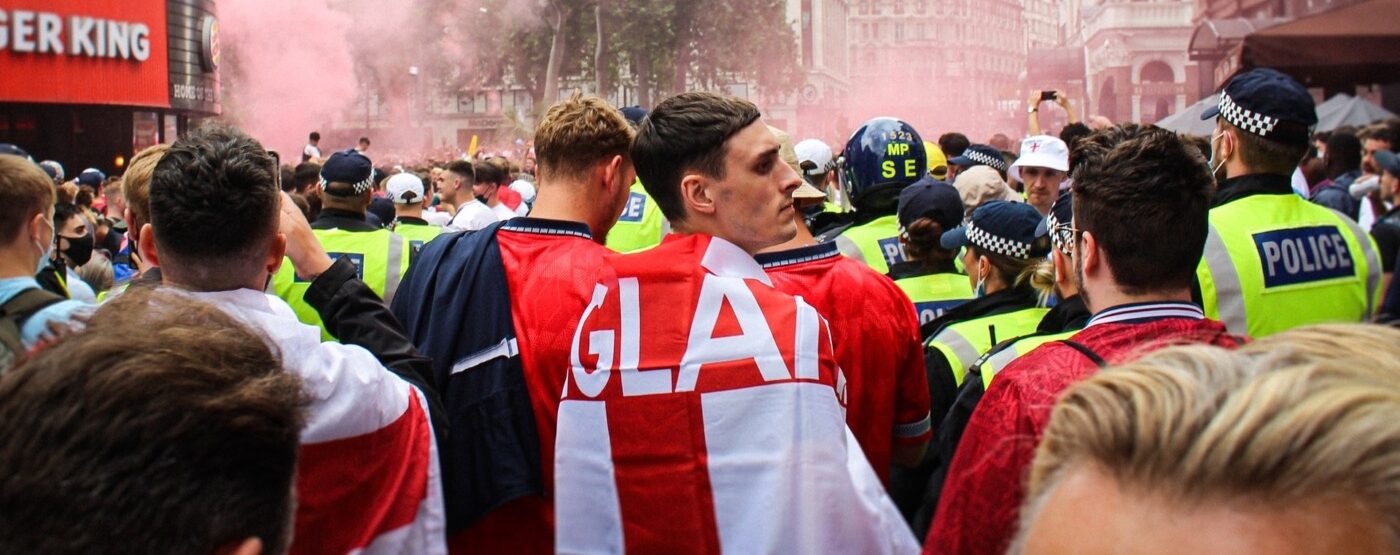Is the aftermath of racism following the Euros enough to reignite the Black Lives Matter momentum in Britain?
Although I am not the biggest football fan, the progression of the English team during the Euros this year built up the greatest level of excitement I’ve ever had about the sport. In particular, seeing such a diverse team with a handful of black players from London made me feel more inclined to celebrate and cheer the team on. Up until the finals, I loved being able to connect and celebrate with English fans in the pubs. But in the back of my mind, I had a gut feeling that this acceptance – especially from white football fans around me – was conditional: the black players were performing well for England, so therefore I was acceptable to them.
In some ways, the days following the finals almost became the spark for change that the Black Lives Matter protests in Summer 2020 attempted to achieve
Whilst watching the finals in a local pub, I joked to my friends that Raheem Sterling needed to score ‘for my own sake’. But as time kept going on, it was clear this match would end in penalty shootouts against one of the strongest teams in the world – and thus England’s chances of winning were very slim. What was more heart-breaking, however, was witnessing Marcus Rashford, Jordan Sancho, and Bukayo Saka miss their penalties. I immediately felt eyes targeted at me by a particular group of men who had made me uncomfortable the whole night, so I knew immediately I was not safe. Having to flee the pub and cry on the toilet floor at my friend’s house, watching the outpour of racist tweets and comments online, was an outcome I had joked about throughout the Euros, but one I had prayed would never happen.
Anyone shocked by the disgusting racist attacks against these Black players is not just naïve, but has simply been privileged enough to shut themselves away from the discussions about the conditional ‘Britishness’ that minorities are given. Racism in football is not a new phenomenon, but is rather, in essence, a prominent aspect of the sport. For instance, the Show Racism the Red Card is the UK’s largest anti-racism educational charity that has been around since 1996, and has been important in working alongside teams and players to address the racial abuses and attacks that black and brown players have experienced both on the pitch and online. This endless cycle of racial abuse by football fans and tabloid media coverage, then being condemned by the public and public officials before silence falls again, is a tiring but accepted norm.
However, the outpour of support from the general public is on a scale I have never seen before. Suddenly, these Black players were heroes for the nation. In some ways, the days following the finals almost became the spark for change that the Black Lives Matter protests in Summer 2020 attempted to achieve – a unanimous effort to denounce racist attacks, but importantly, a starving eagerness to find solutions to tackle such issues.
The main problems with all of these promises and legislations is that they fail to tackle the root of the issue surrounding racial abuse in football – the values and attitudes of England itself
So, is this enough to create Britain’s own unique and effective version of the Black Lives Matter movement? The main criticisms that arose last year regarding the protests voiced the ‘Americaness’ of racism that was argued to not be present in modern day Britain. However, this round of racism in English football has, for example, pushed the legislation of the Online Safety Bill, which promises to ‘clamp down on racist abuse online’, whilst Prime Minister Johnson has even pledged to fine social media firms up to 10% of their global revenue if they fail to remove racist abuse.
But the main problem with all of these promises and legislations is that they fail to tackle the root of the issue surrounding racial abuse in football – the values and attitudes of England itself. It’s all good for the government to denounce racism and show their commitment to tackle abuse, but their failure to take accountability for their own contributions – such as refusing to condemn fans who booed England players taking the knee – only enables and normalises the environment in which these racist ideas grow. This repeated rhetoric of the United Kingdom to be the ‘most tolerant country’, specifically the tolerant aspect, relies on a conditional and passive willingness for the white majority to co-exist with minorities – a clear cover for racism to be acceptably unleashed should this invisible, conditional contract be broken. Furthermore, it places further strains and pressure for minority groups to assimilate, and thus abandon their own independent cultural ideas in order to be ‘tolerated’. That is the core issue – they are not wholly accepted. These legislations and attitudes thus aren’t enough to abandon this harmful relationship that is continuously experienced by black people and other minority groups. If Rashford, Sancho, and Saka are able to suddenly switch from being ‘England’s finest’ to being stripped of their Britishness due to missing penalties, it shows that there is a long way to go until the mentality of minorities having to go above and beyond to demonstrate their Englishness is abandoned.

Comments